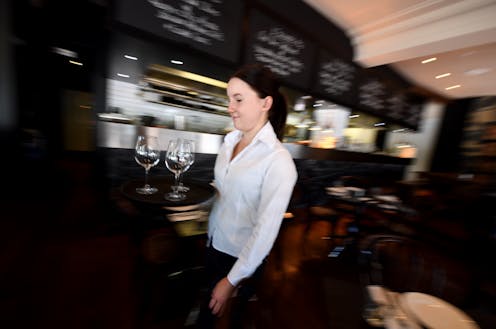Daniel Andrews plans pilot for casual workers' sick pay but Morrison government critical
- Written by The Conversation

The Victorian government plans a pilot scheme for up to five days sick and carer’s pay, at the national minimum wage, for casuals or insecure workers in priority industries.
Even though the initiative is at a very early stage, with $5 million in Tuesday’s state budget for consultation on the pilot’s design, the federal government immediately attacked the move.
Industrial Relations Minister Christian Porter said it “raises a number of major issues”.
Once underway, the pilot would run two years in selected sectors with high casualisation. It could include cleaners, hospitality staff, security guards, supermarket workers and aged care workers.
The pilot would begin late next year or early 2022, and the funding for it would be in future budgets.
“The pilot will roll out in two phases over two years with the occupations eligible for each phase to be finalised after a consultation process that will include workers, industry and unions,” a statement from Premier Daniel Andrews’ office said.
Casual and insecure workers in eligible sectors would be invited to pre-register for the scheme.
While the pilot would be government-funded, any future full scheme would involve a levy on business.
Andrews said: “When people have nothing to fall back on, they make a choice between the safety of their workmates and feeding their family.
"This isn’t going to solve the problem of insecure work overnight but someone has to put their hand up and say we’re going to take this out of the too hard basket and do something about it.”
But Porter said a fully-running scheme would put “a massive tax on Victorian businesses”, which would be paying both the extra loading casuals receive and the levy.
“After Victorian businesses have been through their hardest year in the last century, why on earth would you be starting a policy that promises to finish with another big tax on business at precisely the time they can least afford any more economic hits?”
Porter said it would be better to strengthen the ability of workers to choose to move from casual to permanent full or part-time employment if they wished.
He said this was what had been discussed in the recent federally-run industrial relations working group process involving government and employee and employer representatives.
“It must surely be a better approach to let people have greater choice between casual and permanent employment than forcing businesses to pay a tax so that someone can be both a casual employee and get more wages as compensation for not getting sick leave - but then also tax the business to pay for getting sick leave as well.”
Porter claimed the Victorian approach would be “a business and employment-killing” one.
In the pandemic the federal government has made available a special payment for workers who test COVID-positive or are forced to isolate and don’t have access to paid leave. The Victorian government has provided a payment for those waiting for the result of a COVID test.
The Morrison government will introduce an omnibus industrial relations reform bill before the end of the parliamentary year, following its consultation process.
A central objective will be to streamline enterprise bargaining. Scott Morrison told the Business Council of Australia last week: “Agreement making is becoming bogged down in detailed, overly prescriptive procedural requirements that make the process just too difficult to undertake”.
He said various issues needed addressing. “The test for approval of agreements should focus on substance rather than technicalities. Agreements should be assessed on actual foreseeable circumstances, not far fetched hypotheticals.” Assessments by the Fair Work Commission should happen within set time frames where there was agreement from the parties.
Morrison said key protections such as the better off overall test would continue but “our goal is to ensure it will be applied in a practical and sensible way so that the approval process does not discourage bargaining, which is what is happening now”.

















